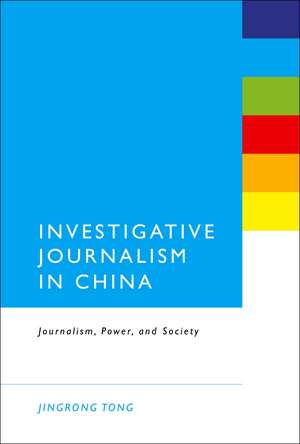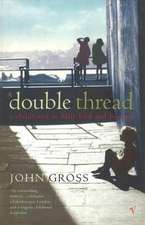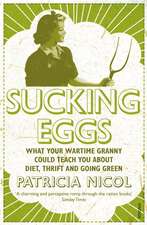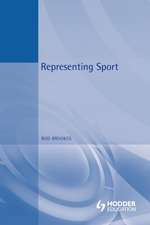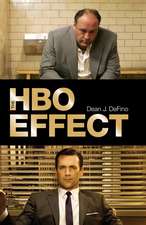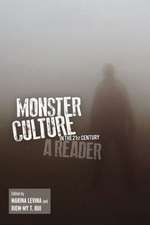Investigative Journalism in China: Journalism, Power, and Society
Autor Dr. Jingrong Tongen Limba Engleză Hardback – 23 mar 2011
| Toate formatele și edițiile | Preț | Express |
|---|---|---|
| Paperback (1) | 258.59 lei 6-8 săpt. | |
| Bloomsbury Publishing – 23 sep 2012 | 258.59 lei 6-8 săpt. | |
| Hardback (1) | 833.37 lei 6-8 săpt. | |
| Bloomsbury Publishing – 23 mar 2011 | 833.37 lei 6-8 săpt. |
Preț: 833.37 lei
Preț vechi: 1198.37 lei
-30% Nou
Puncte Express: 1250
Preț estimativ în valută:
159.47€ • 164.51$ • 133.07£
159.47€ • 164.51$ • 133.07£
Carte tipărită la comandă
Livrare economică 26 martie-09 aprilie
Preluare comenzi: 021 569.72.76
Specificații
ISBN-13: 9781441101044
ISBN-10: 1441101047
Pagini: 280
Dimensiuni: 152 x 229 x 19 mm
Greutate: 0.59 kg
Ediția:New.
Editura: Bloomsbury Publishing
Colecția Continuum
Locul publicării:New York, United States
ISBN-10: 1441101047
Pagini: 280
Dimensiuni: 152 x 229 x 19 mm
Greutate: 0.59 kg
Ediția:New.
Editura: Bloomsbury Publishing
Colecția Continuum
Locul publicării:New York, United States
Caracteristici
Closely examines Chinese journalism and its vehicles by using a micro-approach ethnographic method.
Notă biografică
Dr. Jingrong Tong is Lecturer in Media and Communication, University of Leicester, UK.
Cuprins
List of Figures List of TablesAcknowledgementsChapter 1: Introduction: Understanding "Watchdog Journalism" in an Authoritarian CountryChapter 2: Conceptualizing Investigative Journalism in ChinaChapter 3: The flourishing of Investigative Journalism in the 1990sChapter 4: The fall of Investigative Journalism in the 21st century questionedChapter 5: Maintaining the Legitimacy of Chinese JournalismChapter 6: An Organisational Analysis: the case study of Southern Metropolis DailyChapter 7: Reporting on Social Riots: how investigative journalists tell storiesChapter 8: Investigative Journalism and the PublicChapter 9: Conclusion: Investigative Journalism as a Reforming ForceBibliography
Recenzii
Investigative journalism has become an influential element in the governance of many societies over the last century. Jingrong Tong's book helps the reader to see how knowledge is popularised and information mediated in the world's most populous country, by providing the first book in English on China's investigative reporting. Replete with examples and illustrations, her work expands our understanding both of China and of journalism and is an essential corrective to widespread ignorance of China's media and their often remarkable journalists. -- Hugo de Burgh, Professor of Journalism at the University of Westminster and Tsinghua University, Director of the China Media Centre
The strength of this book lies in its unique inside perspective. Jingrong Tong has studied two Chinese newspapers and spent significant time with journalists on the beat. She has therefore been able to closely observe the whole news making process from the collecting of information and conducting of interviews, to the writing and polishing of initial drafts, to the editing process and the final news report. This enables Tong to provide a more complex analysis than found in most existing scholarship on Chinese media production. She shows how individual journalists and editors in specific media organisations negotiate news bans and propaganda directives and how self-censorship is exercised under the influence of shifting politico-ideological and socio-economic factors and processes. -- Marina Svensson, Centre for East and South-East Asian Studies, Lund University, Sweden
The strength of this book lies in its unique inside perspective. Jingrong Tong has studied two Chinese newspapers and spent significant time with journalists on the beat. She has therefore been able to closely observe the whole news making process from the collecting of information and conducting of interviews, to the writing and polishing of initial drafts, to the editing process and the final news report. This enables Tong to provide a more complex analysis than found in most existing scholarship on Chinese media production. She shows how individual journalists and editors in specific media organisations negotiate news bans and propaganda directives and how self-censorship is exercised under the influence of shifting politico-ideological and socio-economic factors and processes. -- Marina Svensson, Centre for East and South-East Asian Studies, Lund University, Sweden
Descriere
Descriere de la o altă ediție sau format:
A mixture of fieldwork and analysis of internal and public documents and media cases accurately survey the field and put it in context.
A mixture of fieldwork and analysis of internal and public documents and media cases accurately survey the field and put it in context.
